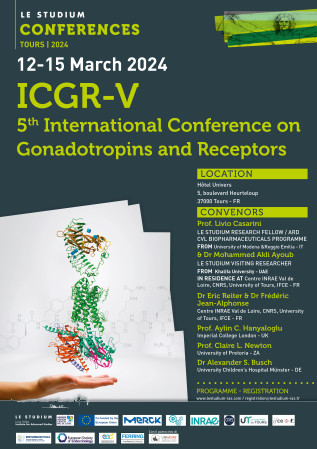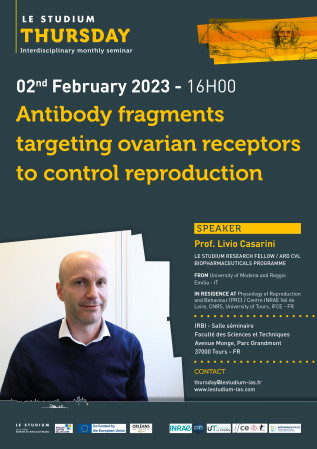Livio Casarini

From
University of Modena and Reggio Emilia - IT
In residence at
Host scientist
Eric Reiter
BIOGRAPHY
Livio Casarini has got the Ph.D. in evolutionary biology, in the year 2009. His research is focused on sex hormone signalling and receptors, steroidogenesis, ovarian and thyroid cancer, as well as on related pharmacological aspects. Livio is associate professor at the University of Modena and Reggio Emilia and team leader of the research Group in basic and translational endocrinology. Currently, his research activities fall within the field of gonadotropins signalling in the gonads, sex steroid hormones and thyroid pathophysyology. One of the core projects aims to develop a nano antibody-based, non-hormonal contraceptive method.
PROJECT
Research Fellowship in Antibody fragments targeting ovarian GPCRs to control reproduction
Clinical approaches to improve couples fertility or contraception are based on hormonal treatments that may have side effects and imply daily administration of drugs.
Recently, the use of antibodies as therapeutics is increasing, but they are not currently applied in the field of reproduction. In silico methods for antibodies and nano-antibodies (nanobodies) selection and maturation may be exploited for the development, validation and application to different therapeutic targets. In particular, nanobodies are small, poorly immunogenic biopharmaceuticals that may be developed to target sex hormones and their receptors, offering the potential to modulate male and female reproduction and behavioural issues.
The position is based at the Physiology of Reproduction and Behaviour (PRC) unit, a mixed research unit of the Centre INRAE Val de Loire in Nouzilly, the University of Tours, the National centre for scientific research (CNRS), and the French horse and riding institute (IFCE), that is leader in the field.
Publications
Final reports
In this study, we tackled the challenge of developing modulatory antibodies against G protein-coupled receptors, with a specific focus on the follicle-stimulating hormone receptor (FSHR), a pivotal regulator of reproduction. Leveraging variable domains of heavy chain-only antibodies (VHHs), we constructed two immune VHH libraries and implemented multiplexed phage display techniques. Our methodology integrated Multiplexed Phage Display, High-Throughput Sequencing, and Functional Assays to identify modulatory VHHs targeting FSHR. Following library construction, next-generation sequencing identified 34 clusters of specifically enriched sequences. These sequences underwent functional assessment in a primary screen based on a cAMP response element (CRE)-dependent reporter gene assay. Impressively, 23 VHHs displayed either negative or positive modulation of FSH-induced responses, indicating a high success rate for the multiplexed strategy. Subsequently, we focused on the largest identified cluster, PRC1, which exhibited positive modulation of FSH action. We provided evidence that PRC1 specifically binds to human FSHR and the FSHR/FSH complex, enhancing FSH-induced cAMP production and Gs recruitment. In conclusion, our study showcases an improved selection strategy that effectively identifies functionally active VHHs and can be adapted to target other challenging membrane receptors. Notably, this investigation led to the discovery of PRC1, the first potential positive modulator VHH reported for the human FSHR.



